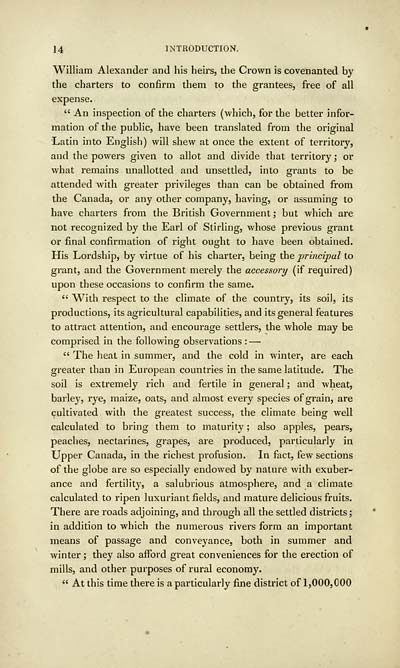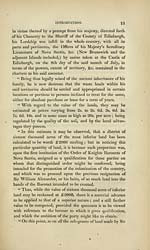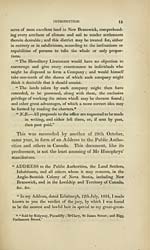Stirling peerage
(24) Page 14
Download files
Complete book:
Individual page:
Thumbnail gallery: Grid view | List view

14 INTRODUCTION.
William Alexander and his heirs, the Crown is covenanted by
the charters to confirm them to the grantees, free of all
expense.
" An inspection of the charters (which, for the better infor-
mation of the public, have been translated from the original
Latin into English) will shew at once the extent of territory,
and the powers given to allot and divide that territory ; or
what remains unallotted and unsettled, into grants to be
attended with greater privileges than can be obtained from
the Canada, or any other company, having, or assuming to
have charters from the British Government ; but which are
not recognized by the Earl of Stirling, whose previous grant
or final confirmation of right ought to have been obtained.
His Lordship, by virtue of his charter, being the principal to
grant, and the Government merely the accessory (if required)
upon these occasions to confirm the same.
" With respect to the climate of the country, its soil, its
productions, its agricultural capabilities, and its general features
to attract attention, and encourage settlers, the whole may be
comprised in the following observations : —
" The heat in summer, and the cold in winter, are each
greater than in European countries in the same latitude. The
soil is extremely rich and fertile in general ; and wheat,
barlej', rye, maize, oats, and almost every species of gi-ain, are
cultivated with the greatest success, the climate being well
calculated to bring them to maturity ; also apples, pears,
peaches, nectarines, grapes, are produced, particularly in
Upper Canada, in the richest profusion. In fact, few sections
of the globe are so especially endowed by nature with exuber-
ance and fertilit}', a salubrious atmosphere, and a climate
calculated to ripen luxuriant fields, and mature delicious fruits.
There are roads adjoining, and through all the settled districts ;
in addition to which the numerous rivers form an important
means of passage and conveyance, both in summer and
winter; they also afford great conveniences for the erection of
mills, and other purposes of rural economy.
" At this time there is a particularly fine district of 1,000,000
William Alexander and his heirs, the Crown is covenanted by
the charters to confirm them to the grantees, free of all
expense.
" An inspection of the charters (which, for the better infor-
mation of the public, have been translated from the original
Latin into English) will shew at once the extent of territory,
and the powers given to allot and divide that territory ; or
what remains unallotted and unsettled, into grants to be
attended with greater privileges than can be obtained from
the Canada, or any other company, having, or assuming to
have charters from the British Government ; but which are
not recognized by the Earl of Stirling, whose previous grant
or final confirmation of right ought to have been obtained.
His Lordship, by virtue of his charter, being the principal to
grant, and the Government merely the accessory (if required)
upon these occasions to confirm the same.
" With respect to the climate of the country, its soil, its
productions, its agricultural capabilities, and its general features
to attract attention, and encourage settlers, the whole may be
comprised in the following observations : —
" The heat in summer, and the cold in winter, are each
greater than in European countries in the same latitude. The
soil is extremely rich and fertile in general ; and wheat,
barlej', rye, maize, oats, and almost every species of gi-ain, are
cultivated with the greatest success, the climate being well
calculated to bring them to maturity ; also apples, pears,
peaches, nectarines, grapes, are produced, particularly in
Upper Canada, in the richest profusion. In fact, few sections
of the globe are so especially endowed by nature with exuber-
ance and fertilit}', a salubrious atmosphere, and a climate
calculated to ripen luxuriant fields, and mature delicious fruits.
There are roads adjoining, and through all the settled districts ;
in addition to which the numerous rivers form an important
means of passage and conveyance, both in summer and
winter; they also afford great conveniences for the erection of
mills, and other purposes of rural economy.
" At this time there is a particularly fine district of 1,000,000
Set display mode to:
![]() Universal Viewer |
Universal Viewer | ![]() Mirador |
Large image | Transcription
Mirador |
Large image | Transcription
Images and transcriptions on this page, including medium image downloads, may be used under the Creative Commons Attribution 4.0 International Licence unless otherwise stated. ![]()
| Histories of Scottish families > Stirling peerage > (24) Page 14 |
|---|
| Permanent URL | https://digital.nls.uk/95006138 |
|---|
| Description | A selection of almost 400 printed items relating to the history of Scottish families, mostly dating from the 19th and early 20th centuries. Includes memoirs, genealogies and clan histories, with a few produced by emigrant families. The earliest family history goes back to AD 916. |
|---|

